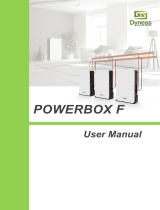
www.phocos.com 1 | P a g e
1.0 Introduction
This guide outlines the recommended settings and establishing communication for operation of one or more Any-
Grid™ PSW-H-8kW-230/48V, PSW-H-5kW-230/48V, PSW-H-5kW-120/48V or PSW-H-6.5kW-120/48V hybrid inverter
chargers with Shoto SDA10-48100 battery modules in the low-voltage (48 Vdc nominal) configuration, referred to in
this guide as “battery modules”.
Note that the charge/discharge settings are automatically negotiated with the battery if this guide is used and
cannot be changed. If you wish to manually set these settings, then a communication cable between the PSW-H and
batteries is not needed and the battery type in settings menu 05 of the PSW-H must be set to “User defined” (USE). In
this case it is your responsibility to choose settings within the specifications of the battery to preserve the battery
warranty.
The Any-Grid must be installed according to the Any-Grid “User and Installation Manual” included with every Any-
Grid unit and available online at www.phocos.com. The battery terminals of the Any-Grid must be connected to the
batteries according to the Shoto installation manual at the appropriate step mentioned in the chapter “5.0 Battery
Settings and Communication Cable Installation” of this manual.
WARNING: Be sure to read and respect the warnings in the installation manuals of the Any-Grid, the battery modules
and any other connected equipment. The installation must be conducted by a trained professional.
2.0 Requirements
The following is required to proceed with this guide:
• Any-Grid PSW-H-5KW-230/48V, PSW-H-5KW-120/48V or PSW-H-6.5KW-120/48V
Note: the minimum display unit firmware version U2 must be 06.19 or later, with the corresponding U1
firmware for your Any-Grid PSW-H.
• Battery communication cable with only the following pins connected:
Any-Grid PSW-H side Shoto battery side
Make sure the cable is correctly oriented between the battery and PSW-H unit when installing below.
WARNING: Do not use the inverter cable included with your Shoto batteries. Wiring your own cable
according to the pinout above must be done at your own risk. Any damage to the PSW-H or battery due to
incorrect wiring, cable orientation or use of an incorrect cable is not covered by any warranty.
• Shoto SDA10-48100 battery module(s)
Pin 8 1
Pin 7 2
Pin 6 3
Pin 5 4
Pin 4 5
Pin 3 6
Pin 2 7
Pin 1 8










